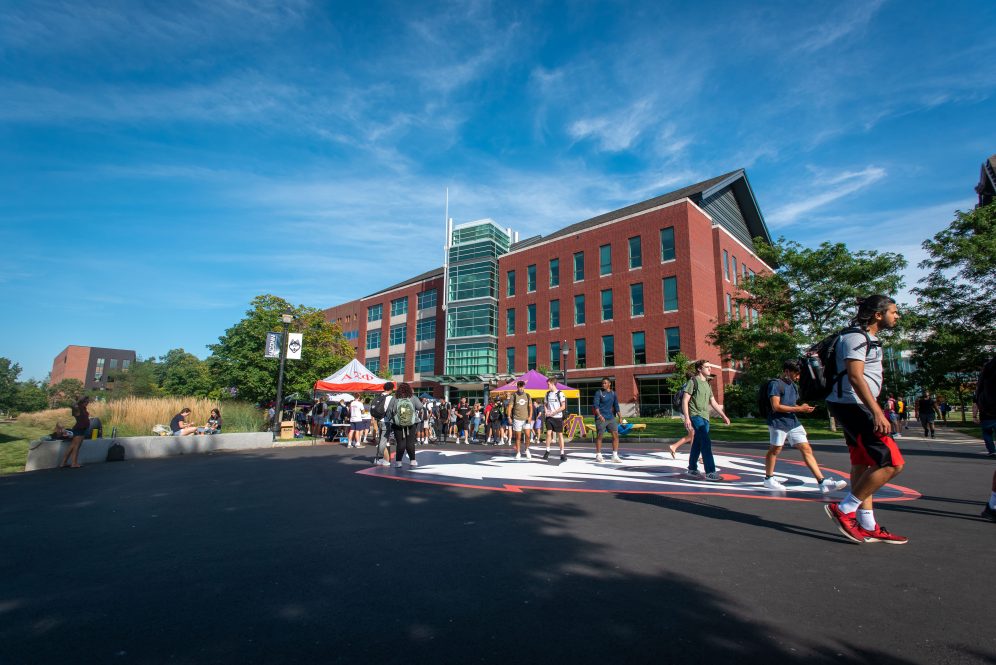A group of UConn student organizations are helping the fight against food insecurity among their peers with the formation of “Husky Market.”
Husky Market provides grocery store gift cards to UConn students who are experiencing food insecurity. The project is led by the Undergraduate Student Government (USG) and UConn Praxis, a student-led group that advances public interest issues and give students the skills and opportunities to practice effective citizenship.
There are a number of other student organizations involved, including Creating Caring Communities, the UConn chapter of the NAACP, Minority Health Matters, and UConntact. The student governments of UConn’s regional campuses also are active in Husky Market.
“Every student at UConn should have a chance, and worrying about food should not be something that a student is stressed out about,” says Ethan Werstler ’22 (CLAS), the vice president of USG and a co-founder of Husky Market. The senior political science and communications major from Woodstock also served as a student-elected member of UConn’s Board of Trustees.
“Students have classes, they have to navigate UConn socially, and they have to worry about getting a job after graduation. Working on the fight against food insecurity exemplifies the role of student advocacy and what we should be doing.”
Food insecurity is an increasing issue at universities around the country. Werstler points to a survey that found 35% of students at UConn Storrs suffer from food insecurity, with higher numbers at regionals campuses.
“Food insecurity is the lack of consistent and reliable access to the financial resources needed to lead a healthy, nutritious lifestyle,” says Werstler. “It can affect anybody, whether you live in dorm or off-campus.”
Husky Market was launched in 2019 as USG purchased groceries and distributed them to students in need. The turnout was immense, and Werstler realized that the program needed to grow.
“We had a food insecurity task force within USG and we were a small working group trying to advocate for initiatives on campus,” says Werstler. “We eventually realized that we should address the problem ourselves. We looked at the funds USG and other student organizations had and found power within us to work directly on the problem.”
Like the rest of the world, it faced a challenge when the COVID-19 pandemic emerged in the spring 2020 semester.
“You would think that running a food program during COVID would be a nightmare, but it was actually a blessing because we were able to take a step back and rethink our entire model,” says Werstler. “We came up with a gift card system that is completely contactless and encompasses all aspects of dietary restrictions.”
In the fall 2020 semester, 140 UConn students received a $300 gift card for groceries, and that number has now grown to over 600 students per semester. In addition to the card, students receive information on how to make healthy choices in their purchases.
The program has now closed for the fall 2021 semester with over 1,100 applications.
“Husky Market is 100 percent funded and organized by students,” says Werstler. “The funds come entirely form our organizational budgets.”
Husky Market works with the University’s Office of Financial Affairs to ensure that a student’s aid package would not be altered because of the receiving of a grocery gift card.
“One of the best things about Husky Market is that it is confidential,” says Srimayi Chaturvedula ’23, who is the coordinator of the hunger and homelessness campaign of UConn Praxis. “You fill out a survey on your phone on your own time and pace and don’t have to tell anyone you did it. You don’t have to walk into some administrative office and tell somebody you need help to get groceries. There is definitely a stigma associated with food insecurity and we don’t want that. We want to let people know we are here to help you.”
Chaturvedula is a political science and business management major who has seen extreme poverty in India when she visits her relatives there.
“You see all dynamics of poverty on an unbelievable mind-altering level in India,” says Chaturvedula. “But, then you come to America and you still see people who need things. These issues are particularly important to me on campus because I feel so connected to UConn. There are people we see and talk to everyday that are struggling with food insecurity, which is heartbreaking to me.”
“Students aren’t learning if they’re not eating,” says Werstler. “It is the fundamental right of a student to be able to wake up in the morning and not have to wonder if they will have three meals in a day. They shouldn’t have to worry about another student bringing them to a dining hall or not eat because they need to pay for textbooks or other life expenses.”



